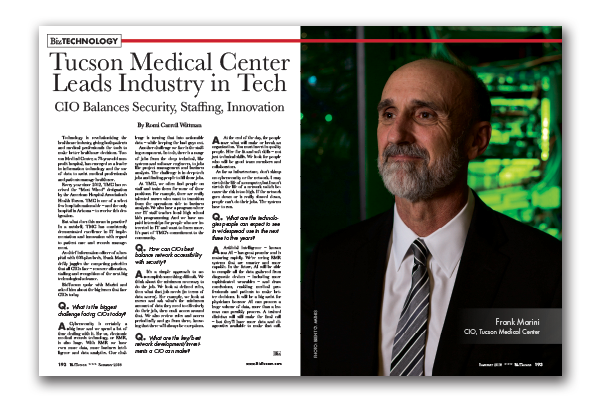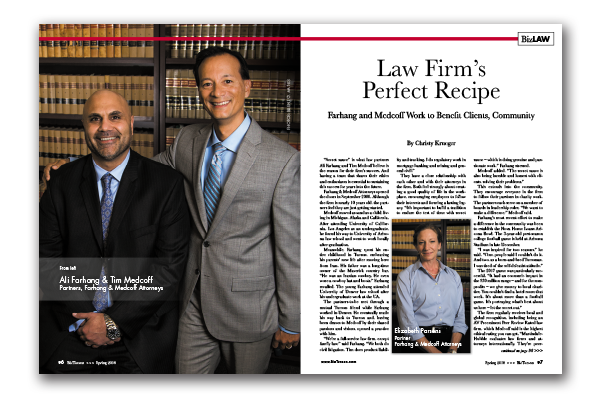
Passion for Economics
By David Pittman –
Like many Tucsonans, George Hammond is right where he wants to be.
But unlike most transplants living here, Hammond’s move to Southern Arizona had nothing to do with warm, dry weather.
Hammond, who formerly headed the Bureau of Business and Economic Research at West Virginia University, took over for Marshall Vest, who retired 2½ years ago as director of the Economic and Business Research Center in the Eller College of Management at the University of Arizona.
The economist said he came here because of the outstanding reputation of Eller College in academic circles around the country and for the opportunity to work with the outstanding people at the UA Economic and Business Research Center.
“I had a great job at West Virginia University,” Hammond said. “The reason I left was this was such an exciting opportunity to work with the staff here at Eller College. I was overjoyed when they hired me.”
When asked if Southern Arizona’s climate had anything to do with his decision to take the job, he said, “If this staff was in Alaska – I would be in Alaska.”
Handpicked for the UA post by Vest, Hammond’s succeeds his predecessor as the most influential economic forecaster in Southern Arizona.
At the annual Economic Outlook Forecast Luncheon in December at the Westin La Paloma Resort & Spa, Hammond predicted Tucson’s economy would grow, albeit slowly, both this year and next.
While Tucson added about 4,200 jobs last year, an increase of 1.2 percent, Hammond said that job growth was below state and national growth rates of 2.0 percent and 1.9 percent, respectively.
He said most of Tucson’s job gains were in the leisure and hospitality industry, professional and business services, and in education, healthcare and financial activities. Tucson experienced job losses in construction and manufacturing.
“Construction continues to be the missing link in the recovery, with employment running at levels last seen in the mid-1990s,” he said. “Slow population and household gains dampened residential real estate activity during the past year.”
Also slowing local economic growth, Hammond said, has been a significant “federal fiscal drag” in the form of declining employment and reduced federal procurement spending. He said reductions in federal spending affect Tucson more than the nation as a whole because federal activity (both civilian and military) makes up a larger share of the local economy.
“According to the latest data, the federal government sector accounted for 7.7 percent of Tucson’s gross domestic product in 2012 – more than double the national share,” he said.
Hammond predicted gradual job growth this year and next, which will reflect a modest increase in net migration to the area and a lessening of the federal fiscal drag.
“Overall, Tucson continues to battle headwinds – but the local economy is growing and moving forward,” he said.
In an interview a few days after that presentation, Hammond said he loves his job at UA, which not only involves economic forecasting, but also research, writing, teaching and managing the Economic and Business Research Center.
In economic terms, we are living in difficult, yet exciting times, he said. “We’ve just lived through the worst economic shock since The Great Depression. If that doesn’t wake you up in the morning when you come to work and think about what is going on, pretty much nothing will. There is always something happening, either nationally, globally or in Arizona to think about and to consider. So I wake up every day excited to come in and find out what is going on and what the latest data shows.”
Hammond’s academic research focuses on the determinants of local economic growth in the United States, the impact of state and local policies on economic growth and the contribution of higher education to local workforce development. His research has appeared in the Journal of Regional Science, the American Journal of Agricultural Economics, International Regional Science Review, Annals of Regional Science and Manchester School Review, among others.
Hammond holds a bachelor’s degree in economics from the University of Colorado and a doctorate in business economics from Indiana University. Before coming to UA, he was on the faculty at WVU for 17 years.
Hammond decided to make economics his career while an undergraduate.
“Economics was my first major,” he said. “I took an economics class and enjoyed it. I liked the structure of it. I liked the math that was involved in it. There was a lot of argumentation. You had to write clearly. You had to think clearly. You had to be able to reason and use math. At the time, computers were becoming more and more of a tool being used – and I thought that was fun too.”
While at college in Boulder, Hammond landed a job as a research assistant at a small economic consulting and forecasting firm.
“I was working down in the trenches with all the data, getting everything ready for the model, doing a first-cut solution of the model then handing it off to the principals of the company who would refine the forecast,” Hammond recalled. “They were paying me for 20 hours a week – but I was probably working 50 hours because I really loved it. I learned there were a lot of these economic consulting firms around and that you could do all kinds of things with a degree in economics.”
Hammond’s hobbies include tennis and fly-fishing.
“I play tennis now and again and I fish when I can,” he said. “There is not so much fly fishing in Southern Arizona – but I now own some land in Southern Colorado that was passed down through my family. There is a great little trout stream that runs through it and I spend some time there every summer.”





